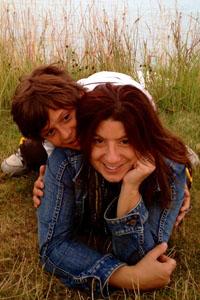
Georgia Hurst is a Lynch Syndrome advocate and creator of ihavelynchsyndrome.com, where she frequently writes about the emotional aspects of having Lynch syndrome and how this diagnosis has affected her life. Her goal is to give Lynch syndrome a much-needed voice both inside and outside the medical community.
My story began with a strong family history of colon cancer. Various cancers had affected many relatives on my father’s side of my family, but it was not until my older brother died of colon cancer at 36 that I realized there was a serious genetic issue in our family. When my other brother was diagnosed with an early stage of colon cancer a few years ago, still in his forties, his doctor recommended we all be tested for Lynch syndrome. Soon after that, at 40, I tested positive for Lynch syndrome and so far have been cancer-free.
A positive Lynch syndrome diagnosis is emotionally challenging for most people to reconcile, as it holds tremendous implications for life, death, reproduction, parenthood, familial bonds, and the meaning of health and illness. We with Lynch feel like we are walking time bombs, and we cannot help but suspect that we are next in line to fall victim to cancer, especially if our siblings have died from one of the many Lynch-related cancers. The diagnosis may encourage a high level of anxiety, depression, and uncertainty. The thought of dying and leaving young children, who may also be affected with Lynch syndrome, is difficult to reconcile.
Experiencing the loss of my mother at a young age, witnessing my brother’s death from colon cancer, and then watching my other brother deal with his colon cancer and total colectomy fuels my anxiety, and I cannot help but think that I will be next. My worst nightmare of leaving my young son motherless could come true.
I underwent the removal of my uterus and ovaries within a few weeks of my diagnosis in order to assume some control over my situation, in the hopes of possibly “diffusing the ticking time bomb.” The doctors minimized what would follow surgical menopause and seemed unaware, in particular, of the need for various forms of hormone replacement therapy. While I may have prevented malignancy in my reproductive organs, I have been confronted with a plethora of new health challenges: thyroid issues, osteoporosis, hair loss, cognitive problems, depression, inelastic skin, and sexual issues, and I am now at greater risk for heart disease and high blood pressure.
Ironically, in less than one week, I will be off to Mayo Clinic to undergo my annual testing for Lynch-related cancers. My annual screening requires two days and will include an endoscopy, a colonoscopy, a mammogram, any other needed imaging tests, a skin exam, and a blood and urine analysis. My anxiety increases exponentially while leading up to this time. We with Lynch syndrome are “ill” until our annual testing proves us otherwise.
However, there is no need to sit passively and wait for one of the Lynch-related cancers to manifest. People concerned about having Lynch syndrome should collect their family history and speak with a genetic counselor. Genetic counseling is highly recommended prior to and after genetic testing in order to understand the complexity of a Lynch syndrome diagnosis and its annual screening protocols. Genetic counselors and medical practitioners also can help with referrals to other specialists, such as therapists and psychiatrists, who can help guide you through the emotional labyrinth of a Lynch syndrome diagnosis.
We with Lynch also need to be aware that our entire lifestyle can play a role in whether a mutation is expressed. Lynch syndrome is something that can and should be fought by taking prophylactic measures—eating nutritious foods, reducing stress, exercising, and getting psychological support.
